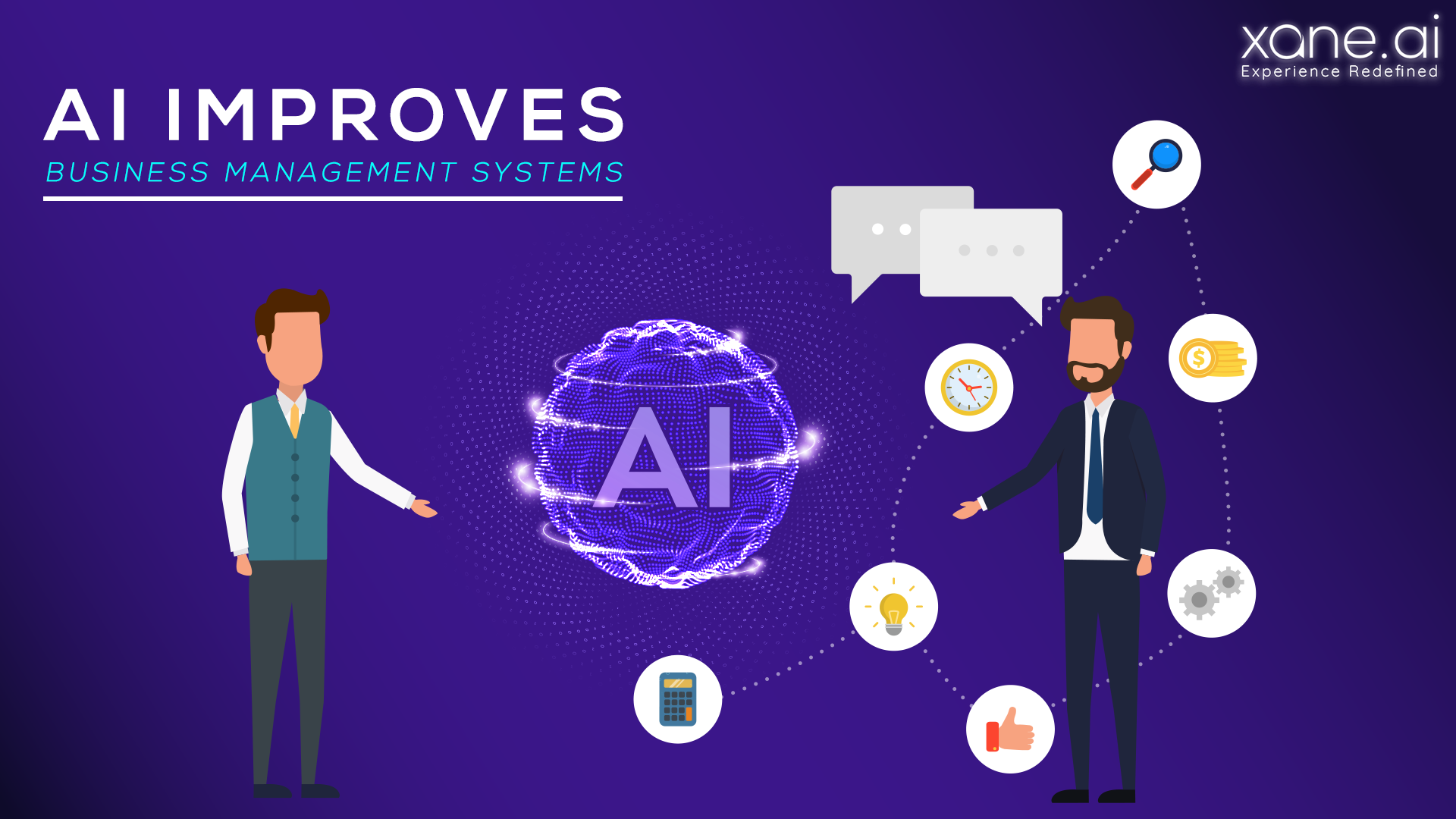
06 Jan How Artificial Intelligence improves business management systems?
Blog by Oluwasegun Oke
Application of AI in business management offers more than today’s technological architecture, based on recent studies of Algorithm Development platforms, Artificial Neural Network future investment, and Deep learning processing capabilities. It sets a new stage to reverse decision-making practices, of struggling AI technology platforms, scattered across different fields of business management processes, such that their efforts are more streamlined, simplified, and clearly understood, which in turn helps focus on aimed objectives and practicalities, thereby proferring real-time solutions and enhancing business management.
We can therefore expect to be connected with more sophisticated AI-inspired business management technological solutions, such as Google Home, Amazon Personal Assistant (Alexa), and Apple Voice Assistant (Siri), which have redefined how businesses are performed in a large scale perspective.

And when we move on to 2030, which has been established as the year that we see AI market value estimation to be $15.7 trillion. As new amazing products and services multiply in folds over time, across diverse business orientations, becoming faster, cheaper, and efficiently powered Algorithms.
Since Robotic Process Automation Technology is fused with Artificial Intelligence, it aids automation over a broad aspect of business operations, for processing complex tasks accurately, under significantly reduced man-hours.
And measuring its outstanding contributions in enterprise transformation, and customer support system automation, since its formal introduction, in 1956. This created a shift in marketing strategies and underlined the urgency to embrace a safer means of building business processes while reducing errors in repetitive tasks to the barest minimum.
So in order to build a more viable business model, that is customer-friendly, extensively leveraged, and a better competitive upper hand, a high-quality algorithm is recommended, which makes the best approach to retain the power of AI technology to revolutionize industries.
And in order to understand more clearly the interrelationship between AI and business management systems, we shall define this through the concept of how businesses can benefit directly from its application.
ARTIFICIAL INTELLIGENCE AS DEFINED IN BUSINESS MANAGEMENT
Artificial Intelligence as applied in business management, refers to the development of AI algorithms by brands, which are capable of incorporating deep learning, and facilitating a wide range of business processes, while promoting best practices, such as high customer conversion, error-free operations, time-saving mode, reduction of man-hours, therefore reducing prices of products and services, for optimization of efficiency, and sustainable growth.
THE CONCEPT OF DEEP LEARNING

As poorly performing business managers are continually in search of better multi-purposedly matched Algorithms to explore, engaging in automated large-scale AI decision-making, can be a game-changer. And data security may be breached, due to low coverage from equipment capacity, in separate divisions. This is when the concept of artificial neural networks is widely embraced. And is incorporated, such that the proposition of data becoming masses of interacting networks of nodes, continually form layers, which are able to learn complex business processes, the more they are used, in various repetitive business operations. And is revered to make even unanticipated unilateral decisions, that are poised to optimally impact unforeseen challenges, for a rewarding business campaign.
APPLICATION OF AI IN BUSINESS MANAGEMENT
Business managers often practice current trends, in the branding of their products and services. Such initiatives accelerate projected targets, boost production efficiency, and maximize campaign efforts, as business managers optimize their brand’s performances, through the application of AI, to expand their reach and further be aligned with possibilities. And highlighted below are proven ways businesses incorporate AI into the management of their brands:
MARKETING AND SALES CAPACITY
Being able to manage brands even through economic downturns, and safeguarding customers’ personalized interest, require a strong marketing sales division, flexibility, and the best of customer support, among other initiatives, to be assessed by end-users. And the following are ways marketers take advantage of AI in their fields:
Promotion of Marketing Advertisement: The study of datasets in dashboards of such companies, through deep learning, which works on a well-structured pool of data, to learn patterns of buying customers, communicate individual metrics to improve marketing strategies. These are consequently circulated to respective buyers without being prompted, their already streamlined high return on investment products and services, thereby adjusting in accordance to each customer behavior, and aligning further with their diverse interest, for more opportunities.

Lead Generation: This helps in terms of providing each sales division of enterprises with leads, using machine learning algorithms that have evolved over time, to identify certain patterns, needed to search, find and provide information on market audiences who are ready to patronize such products and services.
Predictive Analysis: Most customers prefer engaging brands that offer certain qualities, with high valuation usage of propensity modeling, which basically predicts the degree to which a customer is likely to convert.
HR DEPARTMENT
The human resources manager puts a lot of work into achieving a well-rounded decision-making master plan, that meets certain criteria, for the establishment of a dependable mechanism. These are the ways, AI is combined with processes in the human department:
Conducting Job Interviews: Between and doing job interview processes, AI offers great insights into building an effective mode of operation that is updated for future references. It fully automates most interview processes and enhances the easy extraction of preferred candidates’ resumes from a central database system. And conducting interviews with AI-powered analytics show in detail, each video content and also transmits the right tone of voice used by every candidate.
Screening Resumes: AI can easily sift through resumes in a network database of a brand or across its affiliated third parties, to select the best candidates, out of their applicant tracking system for a particular role. This efficiently prepared AI competitiveness and structurally organized criteria enhance flexibility and reduce workloads.
Job Automation: AI human resources updated policy allows for the scheduling of meetings, and processing of tedious tasks, using Robotic Automation in performance evaluation, salary processing, resume analysis, addressing employee enquires, and so on.
Maintaining Records of Application and Queries: AI chatbots for instance are essentially used in notifying candidates, and also support the interaction and collection of employees’ feedback. And since quick responses to each candidate query are critical, thus AI provides a competitive edge with real-time access for highly qualified candidates to be proactively selected.
ENHANCING FINANCE AND OPERATION
Here we dissect how AI efficiently improves finance and operation activities:
Risk assessment: Risk assessment: Deep learning intervention in monitoring market trends, and analyzing borrowers’ data lake, for insightful management decision-making, are imperative to updating the latest transactions, and minimizing loan risk, which can quickly escalate into a complex case study. AI thus integrates these processes effectively, while eliminating risk.
Business Intelligence: Our business aspirations in today’s scheme of things, can never be completed, without, for instance, deep learning, for automated forecasting through business decision-making algorithms, best products, and services in the marketplace, as well as tailor-made customer support. Business organizations are therefore able to perform optimally due to AI-driven solutions, positioned to identify loopholes, select the best strategies, and boost capacity.

Customer Data Management: Paper document characters can easily be converted to a digital format replica. This concept is powered by AI technology, which serves as interphase for maximum extraction of character data, for storage, processing, and retrieval. Also, business management is heavily dependent on text analysis and NLP, for the effective transaction which is fast, secure, and relatively accessible.
Automated Virtual Financial Assistant: Robo advisors are getting more usage within tech-startups and financial institutions, due to their automated monitoring of daily stocks and bonds activities. It thus keeps the performance records through metrics and also provides stakeholders with recommendations regarding where to invest in stocks and bonds, based on recognizable patterns learn over time.
Fraud Detection: AI is able to facilitate the sifting of databases of suspicious stakeholders, identify inconsistencies, compare it to standard algorithm patterns, and detect fraudulent activities. This is essentially in contrast to what was obtainable previously, when financial activities were not fully coordinated or registered, due to usage of non-AI technology.

